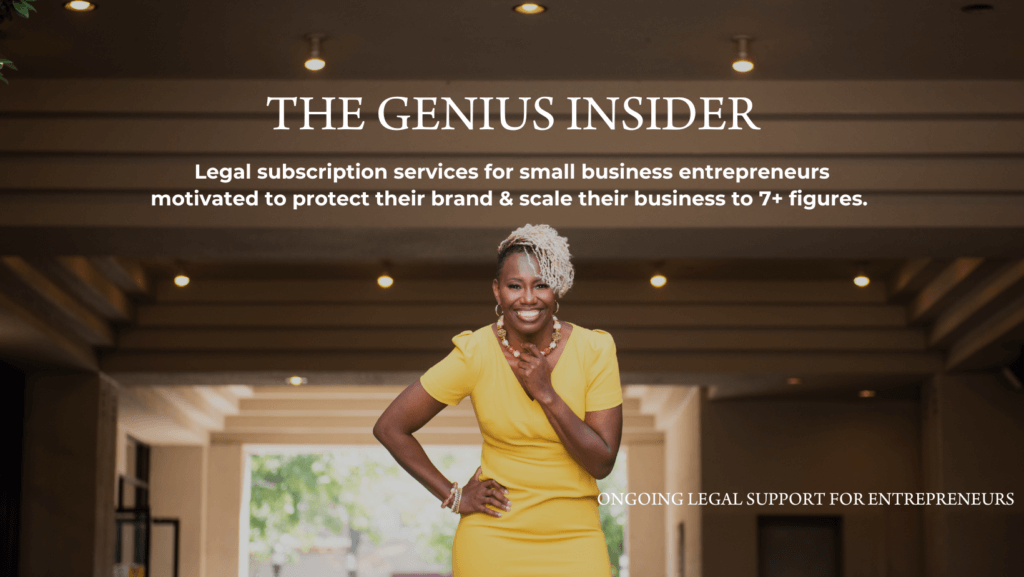And just like that, we’re back. Another Wednesday, another genius podcast for you to listen to. Last week we finished our four-week series on business formations where we discussed the pros and cons of operating as a sole proprietor, partnership, corporation, and limited liability company. Many of you were excited about the limited liability associated with corporations and limited liability companies, but do you know what’s required to maintain your limited liability status?
Welcome to episode 122 of the Own Your Genius podcast. We wrapped up our four-week series last week, so let’s consider this episode a bonus.
I couldn’t talk about corporations and limited liability companies without talking about what’s known as piercing the veil. This conversation is necessary because so many business owners form these structures because of the limited liability benefits with the false belief that forming the entity is all they need to do to stay protected. If you haven’t listened to episode 120 or 121, where we discuss the benefits and consequences of operating as a corporation or limited liability company, make sure to listen to those episodes. However, for this episode, it’s important to understand what limited liability is, so we’re gonna jump into that.
Limited liability was created by law to provide protection to owners, also known as shareholders, if they’re in a corporation or members, if they are in a LLC. So by limiting the limited, by limiting their personal liabilities for debts, obligations and legal actions of business. Hmm, do I like that? We’re gonna start that all over, that part. So limited liability was created by law to provide the owners protections. Nope, again.
Limited liability was created by law to provide protections to the owners by limiting their personal liability for debts, obligations, and legal actions of the business. So in the case of a corporation, the owners are called shareholders. And for the shareholders, their liability is limited only to the amount they have actually invested into the company. The personal assets are generally shielded and protected from being used to satisfy any type of corporation debts or legal obligation, which in turn encourages investments into corporations by offering this level of security for shareholders. On the other hand, limited liability companies, when you own a limited liability company, you’re referred to as a member and they have a similar protection. And for members of an LLC, the members’ personal assets are typically not at risk to satisfy the company’s debts or legal obligations, unless they have personally guaranteed those obligations. So their liability is gonna be limited to the extent, again, to their investment to the LLC, unless they have personally guaranteed obligations. That’s why the big thing is when you’re signing a contract, to make sure you sign it. as your company, not as yourself. Because if you are a business owner and you’re entering into that agreement as yourself, then you are personally guaranteeing whatever obligations are under that contract. Which means it’s not going to be limited to the business assets.
So let’s give an example of what we’re talking about when we’re talking about this limited liability. So it means that if your business enters into an agreement which we just talked about to purchase, I don’t know, X amount of widgets for X amount of dollars for X amount of years. And during that time period, something happens to prevent you from fulfilling your contractual obligation, meaning that, I don’t know, maybe COVID hit or just something happened sales are down and now you can’t afford to purchase these widgets the way that you thought you were going to be able to when you signed the contract. If that happens and the vendor sues you because you’ve breached a contract, if you have this limited liability protection that judgment can only be taken from the business assets. Only the business assets will be responsible for paying that debt. Your personal assets, your car your home, those things that are personal in your personal name are going to be safe.
However, because there is a however, however, this only applies if you’re doing the following. So we’re going to talk about five things that you need to do in order to maintain your limited liability status.
The first thing that you need to do is to adequately capitalize your business. And what we mean by this is providing a business with enough financial resources or money to support the obligations. You want it to be able to meet its financial obligations and be able to pursue its intended activities. So when you form a business, you’re saying what the purpose of that business is. And so you need enough money and capital in order to pursue those activities to fulfill that purpose.
Being adequately capitalized means ensuring that the business has enough funds to cover its startup costs, ongoing expenses, debt repayments, and potential liabilities. So you have to make sure that when you start in your business, you actually have enough money to do so.
The second thing that you need to do to maintain your limited liability status is maintain corporate formalities. As a shareholder, or a member, you must observe certain corporate formality, certain corporate formalities, such as holding regular meetings, maintaining separate financial records, or filing required reports. And all those formalities, all those things that you’re going to be required to do are going to be based on your state because, you know, corporations and LLCs, those are both state-based entities. And so different states have different requirements. You’re going to have to go to your secretary of state or whatever that government agency is in your state to determine what is needed to maintain your status.
The third one is so important. The third thing that you need to do to maintain your limited liability status is separate your personal and business assets. Listen, it’s imperative, so important, that if you’re going to ask the state to separate your personal and business assets, which is essentially what you’re doing when you’re forming an LLC or a corporation. It’s important that you actually maintain and manage those assets separately. How are you going to ask the state to do something that you’re not even doing? So do it, right? So you have to make it easy to distinguish the personal and business assets to maintain your limited liability. If we can’t tell, if it’s a little murky, you risk the chance of losing your limited liability status, and you don’t want that.
The fourth thing that you need to do to maintain your limited liability status is proper conduct. That’s the end of short of it. You need to make sure that you do what you say you’re gonna do. So when you form that corporation or that LLC, you specifically stated the purpose that the business was gonna be formed for. Make sure you’re doing that. Stay away from fraud and illegal activities. And if the business is used to commit fraud or deceive creditors or engage in illegal activities, guess what? You guessed it, you will lose your limited liability. So cut it out. So, oh, perfect example, right?
During COVID, when the different loans and different loans and monies were given out to corporations and businesses, all of a sudden, all these new businesses popped up, all these new LLCs popped up and we know that they really just popped up to defraud the government so they can get this money. And you’re seeing those same businesses and the members that are part of those LLCs or shareholders, a lot of them were LLCs, but even the shareholders who might have started these corporations and these LLCs for the intent of getting this money, now you’re seeing them being indicted. And when they’re indicted, guess what?
The business that’s in trouble is also the owners. And part of the fact, what they do is they make you pay restitution. And that restitution is the money that you defrauded the government. And that’s not gonna be reserved just for the personal assets. Because you formed this business to defraud or deceive creditors and just perpetrate fraud. Now you personally are them, the people that did that, they are gonna be personally liable for paying that money back. So don’t do it.
The fifth thing that we need to consider when we’re talking about maintaining our limited liability status is an actual separate identity. You have to, so this is outside of, you know, making sure that your assets are separate. This is taking that extra step and make sure that your business is actually operating as a separate identity.
You know, a lot of people who have businesses and they have the cards and they give them their number and it’s their cell phone number, right? And they’re operating from the house and anytime you call them, they’re available. Real businesses don’t work that way. So if you’re gonna operate as a separate entity, I want you to have a business address, a business telephone number. Set boundaries, what I mean by business boundaries. Office hours are from nine to five, Monday through Friday. We will respond during this time. Those type of things and make sure that if you’re an LLC you have an operating agreement that details how the day to day is going to be ran. And if you’re a corporation, you make sure that your bylaws are written and they take care of those same, and they’re gonna also discuss those business boundaries. It’s important that the business is not operating as a mere alter ego or a shell for the owners. It has to have a distinct separate decision-making entity. It needs to be set up and needs to be obvious. And those are ways that you need to operate in order to maintain your limited liability status. Because the courts are going to evaluate this.
If someone sued you, more than likely they’re going to sue your business and then they’ll try to sue you personally. They’re going to try it. Even if they can’t succeed, they’re going to try it. But to determine whether or not they can succeed, the court is going to evaluate each of these five things that we just talked about to determine whether or not the corporate veil has been pierced.
Now, piercing the veil is a legal concept and what it does is allows the courts to disregard that limited liability protection that you’re typically afforded as the owner of a corporation or LLC. So the limited liability protection is out the window if that veil is pierced. When it’s pierced, the court is going to treat the business entity as an extension of the business owner. And therefore, the owners are going to be personal liable for the debts, the obligations, all the wrongful actions of the business entity.
So again, they’re going to look at those five things we just talked about and make a determination of whether or not you’re actually operating as you should or if that veil has been pierced.
Now, I will tell you this, that piercing the veil is considered to be an extreme or extraordinary remedy. In the courts, they apply it cautionally. But it is done on a case-by-case determination, and each case is going to be evaluated on its individual merits.
So the standards can vary just depending on the jurisdiction that you’re in, the judge that you have. Because again, states, the laws vary. But as a business owner, you want to make sure, like those things that we talked about, they weren’t hard.
Now I can see where people can get in trouble with number one, making sure that they have enough money in the beginning to support the business, to cover startup costs. But essentially what you wanna do is don’t overextend yourself, right? If you are bootstrapping your business, don’t go out there and get a whole bunch of loans when you don’t have the support that you need to fulfill those obligations, whether it’s sales or other forms of capital to pay back those loans. Like don’t do things like that. You just have to build as you go to match your, the money that you’re putting into the business is what I wanna say.
But all the other ones, if you’re gonna form a business, you do need to manage the, or maintain the corporate formalities and make sure that your personal and business assets are separate and make sure that you’re operating for the purpose that you said your business is gonna be operating and then set those business boundaries so that you can have a separate identity. Those are things that you should be doing anyway as a business.
So that makes it more difficult for the veil to be pierced if someone does try to sue you personally for a business obligation.
Now, because the corporations and the LLCs, they are state-based and I keep saying this over and over again, but I’ll keep saying it. If you need to seek advice from an attorney that’s licensed in your state. So if you’re listening to this podcast and you’re not in the state of Alabama, and I know you love me, I love you, and I would love to help you, but unfortunately I cannot. Not in matters like this. If it’s something federal like your trademarks or your copyrights, I would love to. But when you’re talking about business formation and making sure that you’re compliant, you want to get with someone that’s in your state.
So listen, I’d love to hear about how you’re gonna apply what you learned today in your business. I know we dropped a lot of gems, so I wanna know what you picked up and how you’re gonna put it down.








Responses